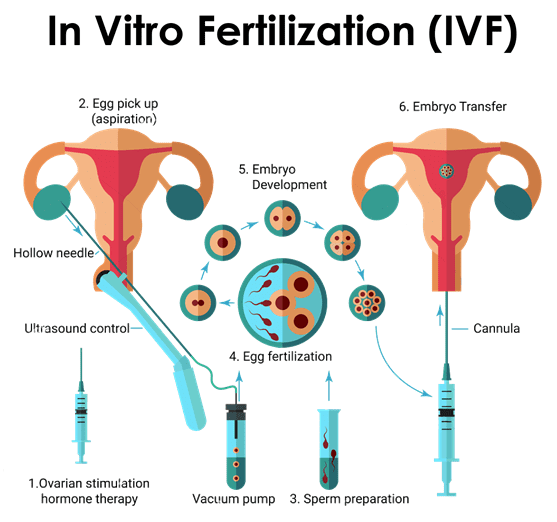
What is IVF Treatment?
IVF treatment or In Vitro Fertilization is fertilization in a “test tube” and the process is carried outside the women’s body in the embryology laboratory. The procedure is carried in a well equipped laboratory with well trained medical staff. This IVF procedure is carried out after collecting sperms from the male body and taking eggs from the female body at the same time. The eggs are fertilized through an advanced lab process and allowed to develop in to embryos in incubators in an environment replicating the human body. Then these embryos are transferred to the uterus for implantation and growing into a baby.
The whole process of collecting eggs and sperms and fertilizing and incubation and embryo transfer is done in the laboratory in the supervision of trained medical personnel. Then after 14 days, the pregnancy test is done to confirm the pregnancy.
How Successful is IVF treatment in India at Delhi IVF?
The success rate of the IVF treatment at Delhi IVF is 40% to 60% which is at par with the best in the world. The success rate varies with the age of the female, as with age the quality and number of eggs go down. But because of the best trained and experienced personnel, and state of the art laboratory we persistently maintain very high success rates.
Who Needs IVF Treatment?
If a couple has lived together and has not used any contraceptive for more than two years and still are without a baby need to be investigated for infertility problem. Infertility may be due to female causes or due to male causes or both.
IVF Treatment is Indicated in Many Situations, A Few are Listed Below:
The Procedure at Delhi IVF for IVF Treatment
The doctor decides the protocol and mode of treatment after a detailed assessment of the case history, previous treatment details, years of marriage, age, and other parameters. For male causes, we have to decide how and from where we get healthy sperm for fertilizing the eggs.
Vitrification
Depending on the insufficiency of the uterus we also have to decide when to cryopreserve the eggs for postponing the embryo transfer to get optimum results. The eggs are preserved by vitrification.
Frequently Asked questions about IVF treatment
Is it possible to try IVF again after a failed cycle?
Yes, it is possible to try IVF again after a failed cycle. Many couples require more than one IVF cycle to achieve pregnancy. Your doctor will typically assess the reasons for the previous failure and recommend adjustments in the treatment protocol. It’s common to modify the medication doses, try a different IVF approach (e.g., using a donor egg or sperm), or explore other techniques like genetic testing or embryo freezing.
How many IVF cycles should I try before considering it a failure?
The number of IVF cycles you may need depends on your specific situation. On average, many women need 2 to 3 IVF cycles to achieve a successful pregnancy, but some may need more. Factors such as age, egg quality, and underlying fertility issues play a role in the number of cycles needed. Your fertility specialist can help guide you through this decision based on your personal circumstances.
Does the chance of success decrease with each failed IVF cycle?
While it is true that the likelihood of success may decrease after multiple failed IVF cycles, many patients do go on to have successful pregnancies with subsequent attempts. The chances of success depend on various factors such as age, egg and sperm quality, the clinic’s success rates, and the reason for previous failures. Your doctor will typically analyze the causes of failure and work with you on adjusting the treatment plan to improve the chances of success in future cycles.

 Your Journey to Parenthood Begins with us!
Your Journey to Parenthood Begins with us!